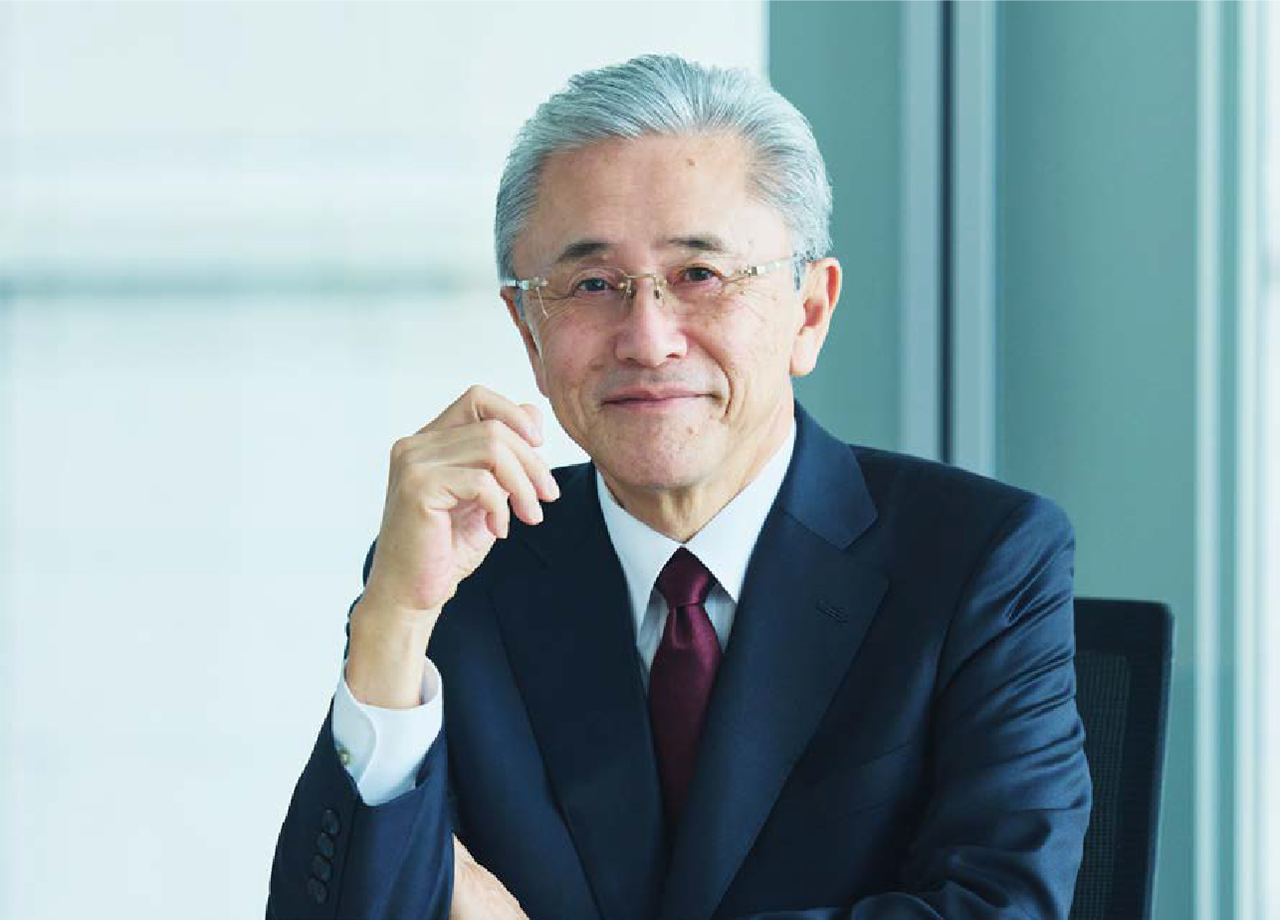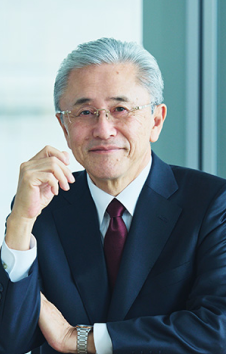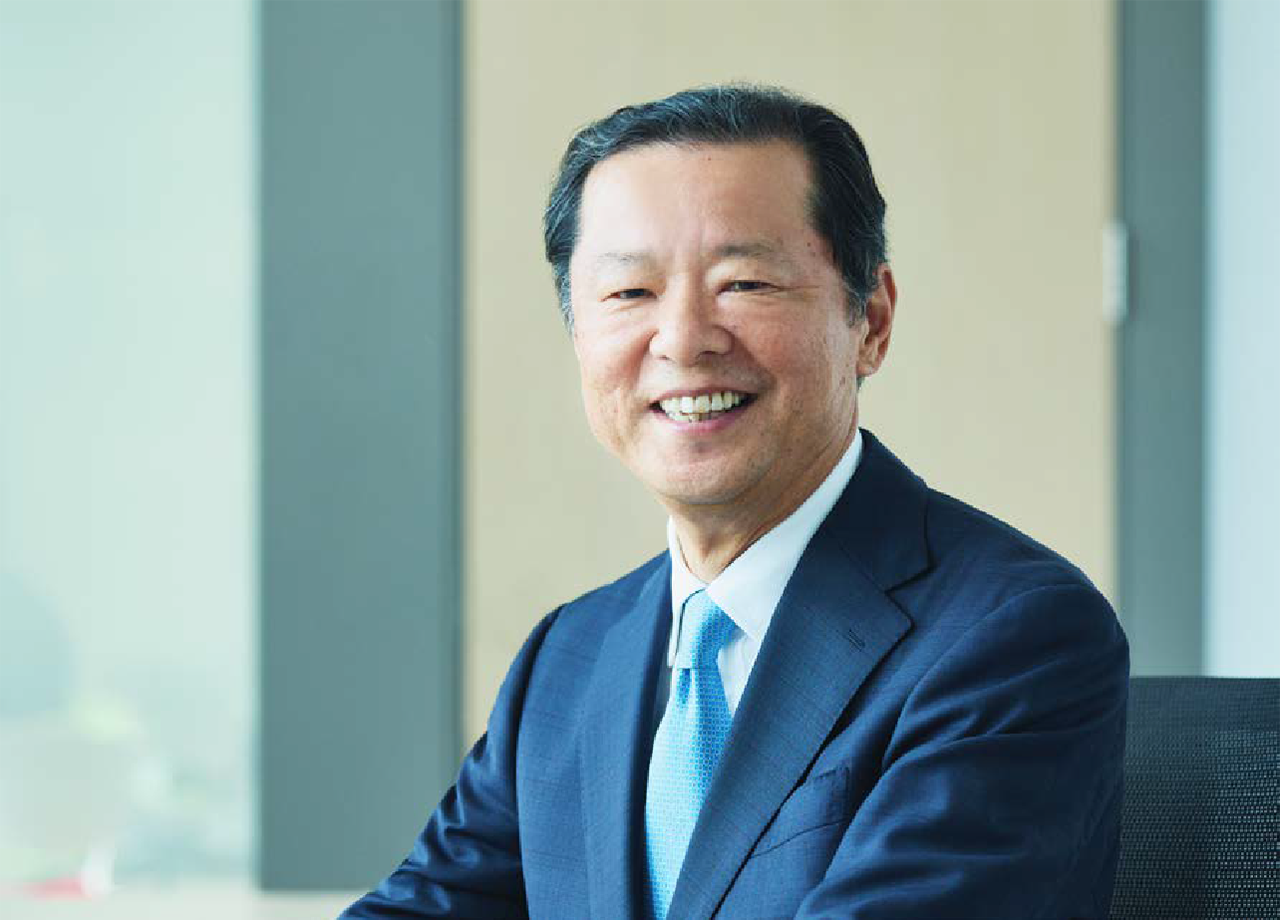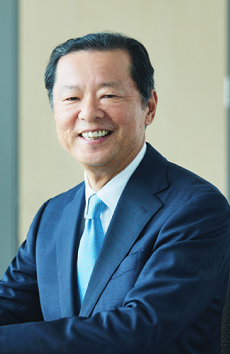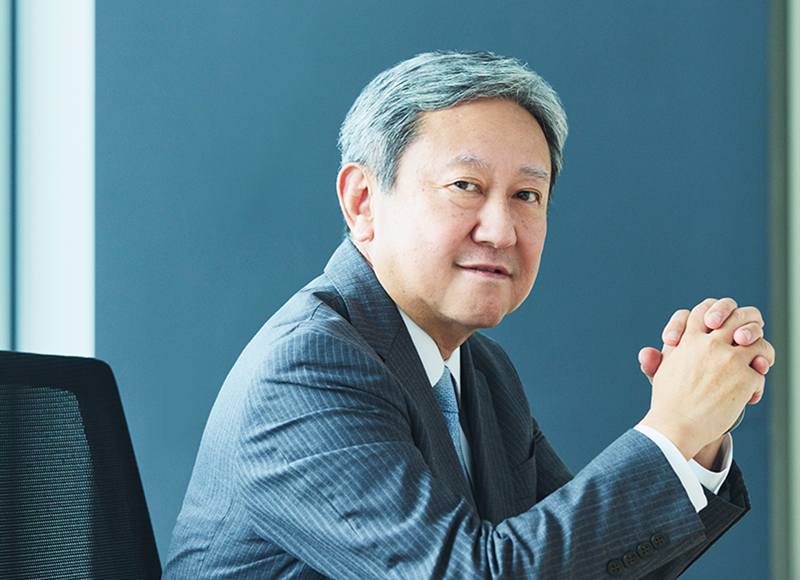

The Mitsubishi Chemical Group is working to transform into a green specialty chemical company. Chairperson of the Board of Directors, Ken Fujiwara, sat down with three outside directors who were appointed to the Group’s Board of Directors in June 2024 to discuss their roles and provide important insight into the Group’s transformation.
(Roundtable discussion held in July 2024)
Ken FujiwaraChairperson of the Board
Impressions of the Mitsubishi Chemical Group
- Fujiwara
- Having been recently appointed outside director, please share your impressions of the Group.
- Sakamoto
- I have been observing the Group’s activities for several decades from the standpoint of both a competitor and a business partner in the chemical industry. The Group engages in a wide range of businesses, and I have always viewed the Group as a leader in Japan’s chemical industry. Using its advanced technological capabilities, the Group tackles social issues head-on in a vast range of fields, including petrochemicals, functional materials, and healthcare, and it has the potential to grow even further. The employees I have been able to work with thus far have been nothing but great and the strength of these employees is, I believe, one of the sources of the Group’s competitiveness.
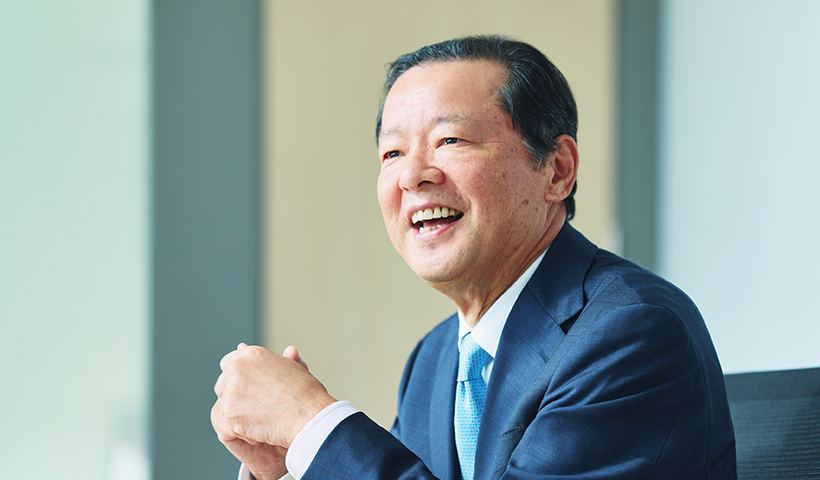
- Eto
- Although I have not had any direct business relationships with the Group, I was certainly aware of the fact that it is the largest company in Japan’s chemical industry. Through the lectures I have attended since assuming this position, I have gained the impression that the Group has confidence in its technological capabilities from a development and production perspective. My understanding is that through the innovation created by these technologies, the Group has long been pursuing a sense of mission to contribute to society, which is expressed in its Purpose, or the realization of KAITEKI.
- Coates
- My relationship with the Group spans nearly 20 years. I have hosted the Group’s researchers in my laboratory at Cornell University, served on the advisory board from a technical point of view, and always been impressed with the quality and originality of the Group's research and the abilities of its researchers. In addition, the diversity of its business portfolio is unique compared with chemical manufacturers in Europe and the United States. The realization of KAITEKI entails addressing a number of environmental and social issues. By harnessing this diverse business portfolio and the innovation created through its technologies, I believe the Group is well positioned to realize KAITEKI.
The Group’s Transformation
- Fujiwara
- The Group is forging ahead with the transformation of its business portfolio and other aspects of its business to achieve sustainable growth. What do you, Mr. Eto and Mr. Sakamoto, think is important for corporate transformation based on your wealth of management experience?
- Eto
- It is important to select businesses and allocate resources appropriately based on a clear vision of what and how the Group will transform for the future. In terms of business selection, the Group must identify where in the value chain it can maximize its contribution and thus be accepted by society as a differentiated corporate brand. However, it must also enhance competitiveness in order to win out against the competition in these selected businesses. A solid financial foundation is also key to transforming businesses.
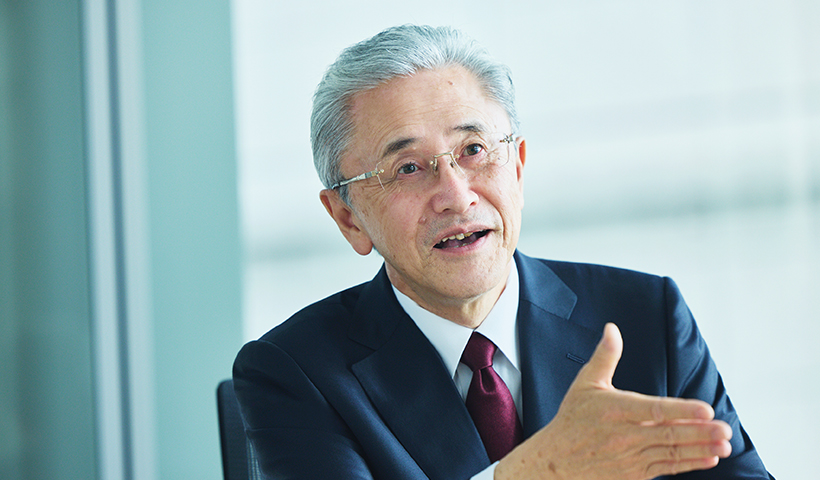
- Sakamoto
- To ensure continuity and sustainable growth, companies must constantly work to transform their business so that they can adapt to changes in the environment and respond to the needs of society. As is often said, the companies that will continue to survive are not the largest or the strongest, but rather the ones that can adapt to change. It is also necessary to determine the best owner for each business in accordance with the market environment at the time and to restructure the business portfolio as necessary.
The existence of partner companies is highly important as well. In the past, I had the impression that the Group more or less grew by building its business foundation on its own; however, in order to create and develop new businesses going forward, it must actively work together with other companies more than ever.
It is not only the Group that needs to change, but rather the chemical industry in Japan as a whole. Compared with Europe and the United States, the chemical industry in Japan has not seen much progress in industry restructuring due in part to the country’s labor-related issues, and this and other factors have contributed to the industry’s relatively low profit margin.
- Eto
- Collaboration with partner companies is certainly important for continued growth. By complementing one another in areas that cannot be covered by one company alone, such as joint research, results can be maximized even with limited resources.
In addition, when the profitability of the entire industry is low, it is not enough to simply win out in the face of competition. The issues need to be determined, which will entail in-depth discussions.
- Fujiwara
- Thank you very much. Beyond the transformation, we have our sights set on becoming a green specialty chemical company that leads the realization of KAITEKI. As outside directors, how do you view this direction?
- Coates
- Even materials that are essential to society, such as plastics, can have significant environmental impacts throughout a product life cycle, from manufacturing to end of life. On the other hand, environmentally friendly manufacturing processes can often be expensive. There is a need to develop sustainable materials that protect the environment and ensure profitability.
The Group has some of the best chemical processes in the world. Starting with the new ethylene method (Alpha technology), which produces MMA with minimal impact on the environment at low cost, I believe the Group will create other environmentally friendly and affordable manufacturing processes that will bring it closer to realizing a KAITEKI society.

- Sakamoto
- It goes without saying that the Group must conduct business activities with emphasis on the environment and the aim of realizing a recycling-oriented society. Moreover, much remains to be done when it comes to developing a business model that generates profits through green businesses. It is essential to design a future vision that enables even green businesses to operate independently as a business and to work toward realizing this vision.
- Eto
- While the development of green specialty chemical products is becoming the entry ticket for chemical companies, in other words, a prerequisite for their business activities, they do not guarantee their survival. “Green-related” businesses may initially receive public support from the government, but that would not last forever. Therefore, the business itself would not be sustainable unless it can generate revenue on its own.
- Fujiwara
- You are exactly right. In order to operate as a business, chemical companies must not only contribute to the environment and society but also generate earnings. In moving ahead with our transformation, from what perspectives will you monitor and offer advice as members of the Board of Directors?
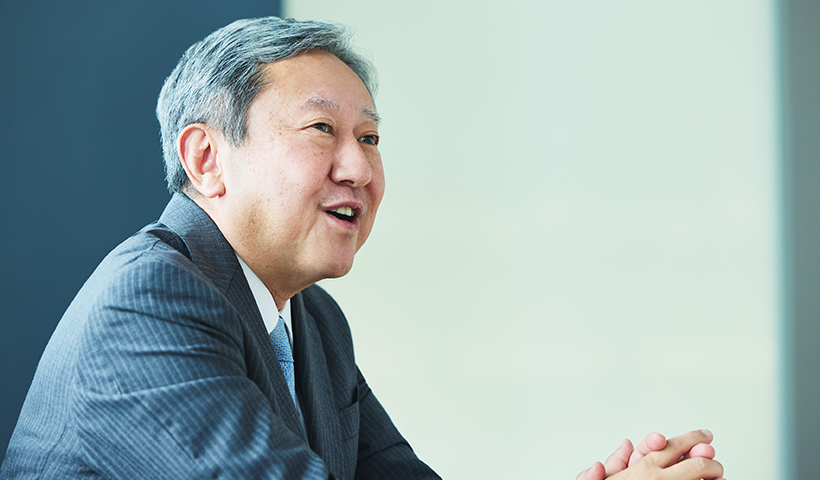
- Sakamoto
- I believe we can learn from the evolution of the chemical industries in Europe and the United States In the past, the measures taken by chemical manufacturers in these regions to improve profitability were much like those of chemical manufacturers in Japan today. By reforming business formats through a series of M&As and reorganizations of business ownership, the chemical industries in these regions achieved improvements in profitability. When considering the future of the Group, I will keep these various possibilities in mind while raising appropriate questions so that the executive side can think about what their optimal business portfolio should look like.
- Eto
- As an outside director, I would like to make sure that the executive side’s approach in promoting the transformation of business portfolios is fully understood and that the key points are being discussed. In determining whether the Group is or is no longer the best owner of a business, it should be able to naturally get a sense of which businesses to continue by objectively considering the obstacles involved. I am aware that the scale of these investments and the responsibility in determining them are significant, so I hope to support the executive side in selecting the best course of action.
- Coates
- Much like the two of you, I would like to offer advice on which areas of business to expand, downsize, or withdraw from a chemical technology and profitability point of view. The development of new materials involves careful investment decisions from short-, medium-, and long-term perspectives. By using techno-economic analysis, which is one of my areas of expertise, I believe I can support executive decision-making by assessing the economic impacts of implementing technology. I am committed to ensuring the sustainability of the Group’s green specialty business.
Aspirations as an Outside Director
- Fujiwara
- Lastly, please tell us your goals as an outside director.
- Sakamoto
- In addition to deepening my knowledge of the Group’s business, I would like to contribute to the enhancement of its corporate value and the resolution of social issues by using the information obtained through Board meetings and other means to invigorate discussions based on sound arguments without reading between the lines. In doing so, I would like to focus on the areas that will lead to the realization of KAITEKI for not only shareholders but all stakeholders, particularly employees, who are the ones that will aim to realize KAITEKI. I say this because such a course of action, I believe, will ultimately gain the trust of shareholders.
- Eto
- This is what I will do to contribute to the enhancement of the Group’s corporate value. I would like to confirm the Group’s equity story with members on the executive side, including the time frame for appropriately allocating limited resources to growth investments. To do this, I will first use Board of Directors’ meetings and other venues to exchange views on the medium-term management plan, which is scheduled to be announced in fall 2024.
I also believe that it is our role as outside directors to communicate with the executive side to ensure that results are distributed in an optimal manner for all stakeholders. Sometimes, I will offer suggestions, and at other times I work with the executive side to discuss the solutions necessary for the Group’s further growth. I will strive to offer valuable insight that will encourage those on the executive side to reconsider their existing ideas and policies.
- Coates
- I decided to serve as an outside director based on President Chikumoto’s desire to transform the Group into a green specialty chemical company. Although this transformation will not be easy to accomplish, the Group has the determination and capabilities to make it happen. I intend to use my knowledge as a scientist and my experience in material development to help grow the Group into a global leader in the chemical field. I am convinced that this will lead to the realization of KAITEKI and enable the Group to provide social and economic value to all stakeholders.
- Eto
- I hope we can discuss the Group’s vision of governance as well. As one of the few corporations with a nominating committee, etc., in Japan, I would like to have open discussions on whether the Group should pursue a strong monitoring-based model, in which the Board of Directors has the right to select personnel for top management and the right to veto power over strategy, or a support-based model, in which we work with the executive side and represent the opinions of stakeholders.
- Sakamoto
- While determining the formal structure for governance is important, I think what is more important is building a management team capable of holding thorough discussions. Through discussions with the management team, I hope we can find the best and most effective form of governance for the Group.

